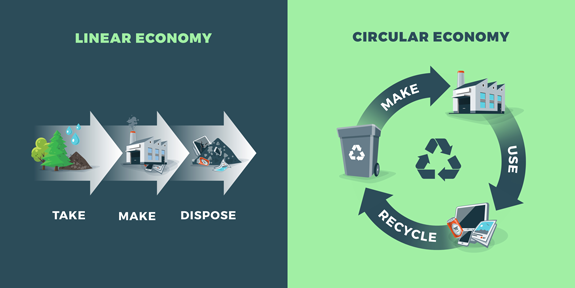EU Directive extends useful life of servers and storage from 2020
Until recently the goal of EU “Ecodesign” directives was to focus on reducing energy consumption. Europeans have seen this in force on all sorts of devices from fridges to vacuum cleaners, it also includes IT equipment.
Free ICT Europe was pleased to provide industry feedback to EU design makers on ENTR Lot 9 – concerning recent changes to regulation of Servers and Storage.
Circular Economy Benefits
Policy changes should make the repair, maintenance, reuse, resell and generally extending the useful life of servers and storage easier.
Great on environmental grounds, meaning the considerable energy used to create devices is not wasted too early, components should be more interchangeable, facilitating reuse or repair. Or parts could be reused to construct new systems, facilitating a circular economy for IT equipment.
(A circular economy is an economic system aimed at minimising waste and making the most of resources. This regenerative approach is in contrast to the traditional linear economy, which has a ‘take, make, dispose’ model of production ~Source )

Pro Consumer, Pro Choice
From an ITAM perspective, this considerably increases the useful life and ability to sweat and gain best use from an asset.
Server and storage manufacturers would much prefer you don’t resell equipment or stretch it’s useful life and impose restrictive firmware and maintenance restrictions to prevent free markets and blocks the circular economy.
Speaking to Computer Weekly, Tomas O’Leary, said:
“The denial of firmware updates has been used as a ransom to control what happens to products.” There is a direct correlation between the availability of firmware, how long a customer can keep the hardware and who is authorised to fix it.”

Jan Hoogstrate, Free ICT Europe
Jan Hoogstrate of Free ICT Europe, commenting on the news, said:
“We see this legislation as a step in the right direction and are proud that the European Commission made the decision to address new elements in legislation that will give more freedom to end-users and will have a positive effect on the businesses that provide repair, maintenance and ICT resellers.”
According to Free ICT Europe, Elements of the directive include:
- (2020) Manufacturers shall ensure that joining, fastening or sealing techniques do not prevent the disassembly for repair or reuse purposes of the key components.
- (2020) A functionality for secure data deletion shall be made available for the deletion of data contained in all data storage devices of the product.
- (2021) The latest available version of the firmware shall be made available from two years after the placing on the market for a minimum period of eight years after the placing on the market of the last product of a certain product model, free of charge or at a fair, transparent and non-discriminatory cost. The latest available security update to the firmware shall be made available from the time a product model is placed on the market until at least eight years after the placing on the market of the last product of a certain product model, free of charge.
- (2020) As part of free accessible product information; instructions on the disassembly operations, including type of fastenings and tools required. Also Information about some materials used (Cobalt, Neodymium) at component level should be provided as input to recyclers.
- The first review is moved forward: already starting in 2021, a draft ready in March 2022.”
PC/Laptops/Tablets and mobile devices are all scheduled for future review. Free ICT Europe is also suggesting Networking equipment should be included.
Room for improvement
The directive does not include some other elements useful for extending the useful life of ICT such as “access to full diagnostics, clear rules for license transfer, no statement addressing the import restrictions of Used systems (no open Circular Economy), maintenance reinstatement fees, spare parts availability in a timely manner, license programs and a compatibility grid to stimulate upgrading.” So, there is still work to do to truly free up markets.
The ability to fix your own car
Alongside servers and storage EU leaders intend to review circular economy elements for lighting, fridges, TV screens, dishwashers and washing machines. Given the pervasive nature of IT across all things, maybe the ability to gain access to the firmware to your own car will also be included!
To stay up to date on Free ICT Europe activities visit https://freeict.eu.
Note: in the interests of complete transparency I’m a volunteer for Free ICT Europe ~ Martin.
Can’t find what you’re looking for?
More from ITAM News & Analysis
-
ITAMantics - April 2024
Welcome to the April 2024 edition of ITAMantics, our monthly news podcast where we discuss the biggest ITAM stories from the last month. George is joined this month by AJ Witt and Ryan Stefani. Stories tackled ... -
Broadcom is removing expired VMware licences from its portal - take action now!
Hot on the heels of Broadcom’s announcement of the end of perpetual licences for VMware it has given customers barely a week to download any keys for licenses from its portal with expired support. This is ... -
Who Loses When Broadcom Wins?
News of a new Broadcom deal rarely arrives with great fanfare. The November 2023 VMware acquisition provoked open worry online and in business circles, with many critics wondering whether the former Hewlett-Packard spinoff’s reputation would prove ...